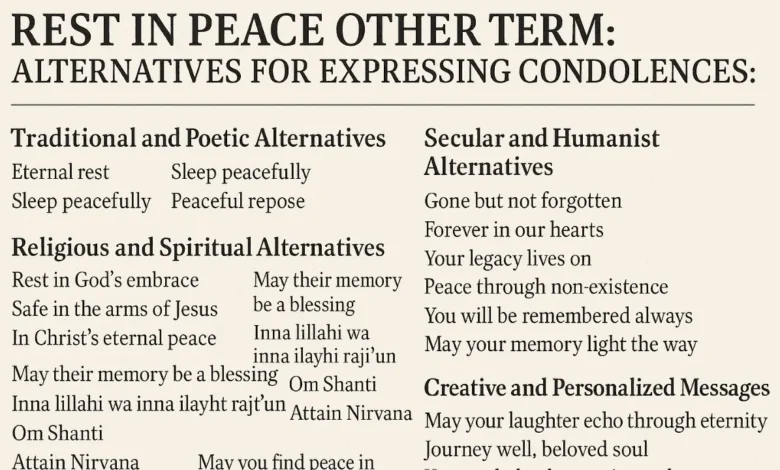Rest in Peace Other Term: Alternatives for Expressing Condolences

When someone dies, offering condolences and expressing sympathy is essential to grieving. One of the most common phrases used is Rest in Peace. While this phrase is respectful and meaningful, you might search for a different or more personalized way to say it. Exploring alternatives can provide a more tailored and heartfelt expression, whether for a eulogy, a social media tribute, or a sympathy card. This comprehensive guide will explore alternative terms for Rest in Peace across different contexts, cultures, and tones, ensuring your condolence message resonates sincerely and deeply.
Why Seek an Alternative to Rest in Peace?
Rest in Peace, often abbreviated as R.I.P., has Latin origins (“Requiescat in pace”) and is commonly used in Christian traditions. However, it may not always reflect everyone’s beliefs or convey the unique tone you wish to express. Here are some reasons to consider alternatives:
- Personalization: Tailor your message to reflect the personality or beliefs of the deceased.
- Cultural Sensitivity: Choose a phrase more appropriate for non-Christian or secular settings.
- Creative Expression: Offer a poetic, spiritual, or heartfelt variation that feels more unique.
Traditional and Poetic Alternatives
These options maintain the solemnity of the original phrase while offering a poetic or timeless quality:
- Eternal rest
- Sleep peacefully
- Peaceful repose
- Rest eternally
- Everlasting peace
- Slumber in serenity
- May your soul be at rest
These are often suitable for formal occasions, obituaries, or religious services.
Religious and Spiritual Alternatives
If the deceased or their family holds specific religious beliefs, these alternatives can align more closely with their faith:
Christian:
- Rest in God’s embrace
- Safe in the arms of Jesus
- In Christ’s eternal peace
Jewish:
- May their memory be a blessing (Zikhrono Livrakha)
Islamic:
- Inna lillahi wa inna ilayhi raji’un (Indeed we belong to Allah, and Him we shall return)
Hindu:
- Om Shanti (Peace be with you)
Buddhist:
- Attain Nirvana
- May you find peace in the cycle of rebirth
These phrases not only offer comfort but also respect the traditions of the bereaved.
Secular and Humanist Alternatives
In modern, secular societies or among those who identify as non-religious, the following alternatives can offer a heartfelt message without religious overtones:
- Gone but not forgotten
- Forever in our hearts
- Your legacy lives on
- Peace through non-existence
- You will be remembered always
- May your memory light the way
These expressions focus on remembrance and the lasting impact of a person’s life rather than the afterlife.
Casual and Affectionate Variations
For personal tributes, especially on social media or when speaking to close friends and family, casual alternatives can be more appropriate:
- Sleep well, my friend
- Rest easy
- Goodnight and goodbye
- Till we meet again
- Rest in paradise
- You were loved beyond words
These phrases are more intimate and often reflect the emotional bond with the deceased.
Creative and Personalized Messages
Sometimes, a truly unique message can be the most powerful. Consider crafting your variation based on memories, personality traits, or shared experiences:
- May your laughter echo through eternity
- Journey well, beloved soul
- Your melody plays on in our hearts
- Rest under the stars you loved so much
- Carried by the winds of peace
Customizing a condolence message in this way can make it deeply personal and memorable.
Euphemisms and Idiomatic Expressions
English is rich with idioms that refer to death more softly or metaphorically. These may suit certain informal or creative writing styles:
- Passed away
- Departed this life
- Gone to a better place
- Crossed the rainbow bridge
- Shuffled off this mortal coil
Use these expressions carefully, especially in formal or sensitive contexts, as they may feel too casual or humorous.
Cultural Considerations
Different cultures have different ways of honoring the dead. Consider the appropriate linguistic and cultural norms when addressing a multicultural audience or writing for someone of a different background. In some Asian cultures, expressions of mourning are often tied to ancestral reverence, while in African traditions, the emphasis may be on celebration and legacy.
Respectful research and consultation with family members or cultural advisors can ensure your message is respectful and appropriate.
Using Alternatives in Context
Here are a few examples of how to use these alternatives in real messages:
- Sympathy Card: “Wishing you strength during this time. May your father find peaceful repose.”
- Social Media Tribute: “You touched so many lives. Rest easy, beautiful soul.”
- Eulogy Line: “Though she has departed this life, her legacy lives on in every smile she inspired.”
Conclusion
It can be challenging to locate the appropriate words during periods of loss. While Rest in Peace is a time-honored expression, there are many other ways to convey your condolences, each offering a unique shade of meaning and emotion. You ensure your tribute is respectful and heartfelt by choosing a phrase that fits the person, the moment, and the message you want to share.
FAQS
For what reason should I contemplate using an alternative to Rest in Peace?
Using an alternative allows you to personalize your message, show cultural or religious sensitivity, and express condolences in a way that may feel more heartfelt, poetic, or appropriate to the beliefs of the deceased and their loved ones.
What are some non-religious ways to say Rest in Peace?
Non-religious or secular alternatives include phrases like “Gone but not forgotten,” “Forever in our hearts,” “Your legacy lives on,” or “You will be remembered always.” These honor the person’s memory without referencing spiritual or religious beliefs.
Are there specific condolence phrases for different religions?
Yes, many religions have traditional expressions. For example, “May their memory be a blessing” is common in Judaism, while Muslims may say “Inna lillahi wa inna ilayhi raji’un.” It’s thoughtful to match your condolence to the person’s faith when possible.
Is it appropriate to use creative or humorous phrases when someone dies?
A creative or slightly humorous tribute may be fitting in close personal contexts or when the deceased had a joyful, lighthearted personality. However, it’s essential to consider the occasion’s tone and the grieving family’s comfort level.
How can I write a personalized condolence message?
To personalize your message, reflect on your relationship with the deceased, their personality, and shared memories. You might say something like “Your melody plays on in our hearts” or “Rest under the stars you loved so much,” making the tribute unique and meaningful.




